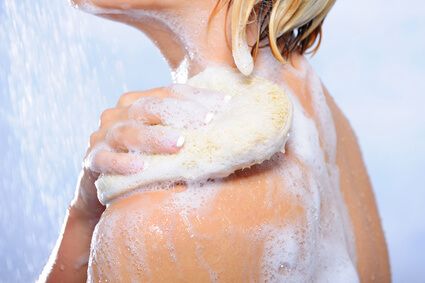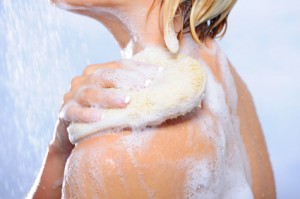
Do you, like millions of other Americans, have a daily shower, whether you are clean or dirty? Does the thought of going a few days without a shower make you uneasy? In our “germaphobic” culture, routine showers are the norm and those that choose to go a different path are not always seen in such a good light.
Such is the case with 55 year old Jennifer Palmer of Malibu, California. Not only does Jennifer go several days without a shower, she actually stopped using deodorant. Ms. Palmer, who works at home, is the CEO of an organic skincare line who wipes away underarm odor with a slice of lemon and washes her feet, face, hands and between her legs on a regular basis with a washcloth, but only showers a few times a week.
From a health perspective, there are many reasons to keep certain parts of the body clean, especially our private parts. However, it is not necessary to run gallons of water down the drain to accomplish this task.
Recent research has revealed that just as the gut contains good bacteria, so does the skin. All that scrubbing we do washes those beneficial germs right down the drain. According to Dr. Richard Gallo, chief of dermatology at the University of California, San Diego, good bacteria encourage the skin to make antibiotics that kill off bad bacteria.
Even if you just hop in the shower for a quick, cool burst of water, washing the important parts, but don’t spend an excessive amount of time soaping, it is better than a long, hot shower.
Excessive showering really aggravates the skin and causes flare ups of such conditions as eczema. While the water washes away healthy lipids and oils, it also removes the good bacteria that keep the skin in balance.
Of course, if you are in contact with a lot of people or ride on public transportation, it is very important to wash your hands, and other body parts that are exposed. This is especially important during cold and flu season.
Big Business
Bathing and cleanliness, like many other things in our country, are big business. Large scale media campaigns create anxiety over body odor, causing us to think we need a whole host of products to stay clean.
The younger generation surely seems to be buying into this, as adults under 24 use deodorant and antiperspirant more than nine times a week. Over 93 percent of the country’s adults shampoo their hair daily, which, like soaping the body, strips the hair of its natural oils.
According to Regina Corso, a senior vice president of the Harris Poll, people are not quite as confident if they do not shower every day. This is mainly because it has been so ingrained in our culture – unlike other cultures.
Perhaps because of this, it appears as though Americans are not about to give up on soaps, shampoos and showers just yet. We are even buying into the fact that we need to dry shampoo in between showers. The sales of these products have more than doubled in recent years, according to one market research group.
Dangers of Soap
Most conventional body soap contains chemicals that your skin readily absorbs. Watch out for such ingredients as:
Sodium Laurel Sulfate – This is what produces the lather effect. However, this chemical is extremely dangerous and should be avoided at all costs. Used as a laboratory standard for irritating the skin and inducing contact dermatitis, this chemical inflames skin on contact.
 Artificial Fragrances – Synthetic ingredients are added to soap to make them smell great. These ingredients can cause extreme skin irritation, allergies and even headaches.
Artificial Fragrances – Synthetic ingredients are added to soap to make them smell great. These ingredients can cause extreme skin irritation, allergies and even headaches.
The dangers of antibacterial soaps are great. They contain Triclosan, which is also found in toothpastes and other consumer products. This relatively unassuming ingredient has been found to pose great toxicological risk to humans.
Researchers have discovered that it can disrupt sex hormonal activity and increase hypersensitive conditions like allergies and asthma. Even though these studies were done at a high rate of exposure, Tricolsan has been found in urine, blood and breast milk, which may mean that the effects, like the effects of many other toxic substances, are cumulative.
Natural Alternatives
Most natural soaps are made from plant-derived glycerin. If you like lather, choose brands that get their lathering effect from coconut. Here are some natural soaps that you can feel good about using:
- Dr. Bronners liquid and bar soaps
- Grandpa
- Kiss My Face
- Juniper Ridge
- Organic Grooming
- Nature’s Gate
- Toms of Maine
- South of France
– The Alternative Daily

